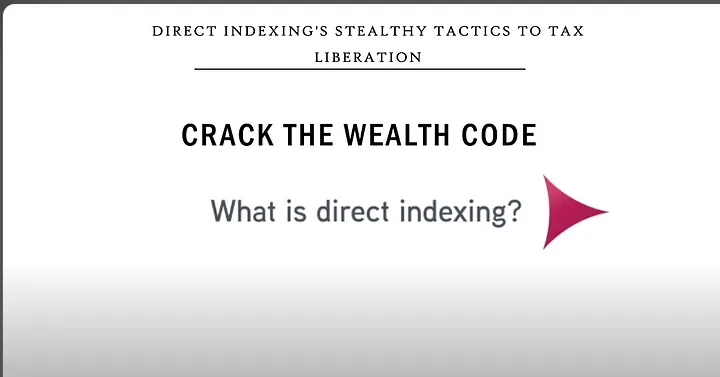Navigating Financial Freedom: Unleashing the Power of Direct Indexing
In the ever-changing world of personal finance, there's a game-changer making waves—direct indexing. Once only for the big shots, now even folks with 5 grand can get in on the action. Here, we're digging into how direct indexing, teamed up with fancy tech, isn't just about beefing up your investment game; it's a ninja move to slash taxes, borrowing a few tricks from the elite 1%.
 |
Understanding Direct Indexing
Direct indexing is like crafting your own index, think S&P 500 or Russell 2000, but instead of bundling in mutual funds or ETFs, you handpick individual stocks. It's like tailoring your investment suit—kick out the companies that cramp your style.
Tax-Loss Harvesting for Wealth Accumulation
Here's where the magic happens: tax-loss harvesting. Sell those losers strategically, recognize the losses, and boom—offset capital gains. It used to be a VIP move, but now it's open to the masses, potentially saving you boatloads in taxes each year.
Exploring the Mechanism
Customization
According to Steven Conners from Conners Wealth Management, direct indexing is like yanking the curtain off an ETF and doing some selective investing. You call the shots, shaping your portfolio to fit your vibe.
Tax Savings
Adam Taback, the brain behind Wells Fargo Private Wealth Management, spills the beans on how tax-loss harvesting can slice off up to 40% of your returns. Even when the bulls are running wild, you can sell those losses to keep the gains in check.
Reinvesting
Picture this: cash from sold stocks flowing into different investment streams, cooking up potential for future gains. It's like planting seeds and watching your money garden grow.
Fees and Savings
Direct indexing fees sit in the middle ground, somewhere between ETFs and mutual funds. It's a bit pricier than ETFs, but the automated mojo cuts down on the manager's bill you'd get with mutual funds.
Nitin Kumar's story? Dude's rolling in savings, all thanks to tax-loss harvesting with direct indexing. And Andres Olarte? He's on easy street, riding out market storms with a hands-off approach, proving this strategy's got game even in rocky times.
Conclusion
Direct indexing isn't just a financial strategy; it's a lifestyle choice. Aligning your investments with your values, saving on taxes, and letting automation do the heavy lifting—it's the triple threat for a solid financial future.
FAQ
Q: What is direct indexing?
Direct indexing involves replicating an index, like the S&P 500, by purchasing individual stocks, offering investors the flexibility to customize their portfolios.
Q: How does tax-loss harvesting work?
Tax-loss harvesting is a strategy where investors sell losing stocks to offset capital gains, potentially saving thousands in taxes annually.
Q: Are direct indexing fees high?
Direct indexing fees sit between ETFs and mutual funds, offering a more personalized approach than ETFs but with lower managerial costs than mutual funds.
Q: What are the cons of direct indexing?
Direct indexing is not useful in retirement accounts, has restrictions on using specific losses, is subject to the wash-sale rule, and requires a minimum investment.
Q: How to start direct indexing?
To start direct indexing, investors decide whether to self-manage or seek financial advice, research firms offering direct indexing services, and contact advisers from major financial services firms.
Comments
Post a Comment